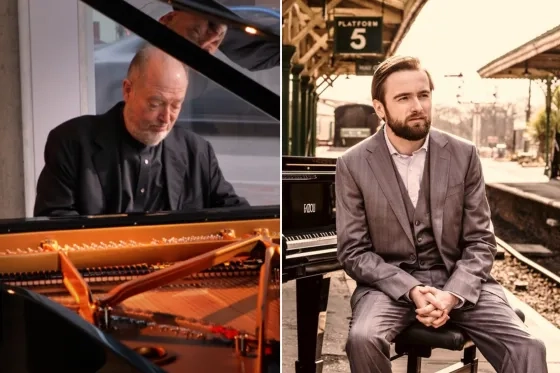Top Takeaways from Garrick Ohlsson and Daniil Trifonov’s SFCM Q&A
Trifonov was in San Francisco to perform a three-night engagement with the San Francisco Symphony under the baton of Esa-Pekka Salonen.
It’s rare to have a pianist on the order of Daniil Trifonov take time out of a three-night engagement with a symphony to visit a music school—unless you’re attending the San Francisco Conservatory of Music.
In February, Trifonov, in town to perform with the San Francisco Symphony, took the short walk from SFS across the street to the SFCM for a discussion and Q&A with SFCM piano faculty Garrick Ohlsson.
Below, read some of the questions posed by students and Trifonov’s responses.
Do you have a backstage routine before a performance?
My mind becomes a little bit more concentrated, and I usually don't have any other distractions for about three hours before and especially the half an hour before the performance. Then my mind goes into the music itself. One of the things I find helps me is if I just don't do that many things during the day. Walking around a city, going to a museum are nice, but those are little emotional distractions that can affect your attention.
Physically, I used to swim before a concert, and I still do it sometimes but now it’s more of just stretching. I did once play golf before a concert, and I found it was really helpful for opening the shoulder blades.
How do you prepare mentally before you go onstage?
My mind goes into the music itself. I like to practice without a piano before performances. I actually rarely warm up in that sense, I usually warm up more in the head, so to speak. I play through different passages, sometimes just in the air. Of course I do practice before performances, but if it’s something I’ve played many times, the work is more mental.
What is the most effective way you found to maintain focus in a high-pressure performance setting?
The highest-pressure performance setting is competitions, because they’re so different from just regular practice. In a way, adrenaline kind of boosts that focus. Solo is more difficult to play in a competition, because there’s so much different repertoire that has to be kept in the hands for several weeks. Adrenaline is really the best help I know, so it could be good to practice in an environment that makes you uncomfortable to trigger a little bit of that so you know how to react when it happens for real.
What is one of the biggest challenges about being a musician?
Finding out what I like about a piece. With some pieces it takes longer, with some pieces less. But there is this process of evolution with each piece that begins the moment you start approaching it and you get to know the music. Then you start practicing it and then you start performing it and as you perform it, your opinion of it changes over time. In every different hall, it works differently; in different pianos you might get new ideas and hear something that works very well but you can’t replicate it because there will be a different acoustic in the next hall. The piece also develops later with the recording process; recording studios sound very different from live halls, and that’s when new ideas can come in as well.
Where do you draw the most inspiration?
Hiking is very nice. Just breathing some oxygen always helps. I would say it's important to get sleep because if I don't sleep well for several days I'm becoming much less productive. Of course different forms of art: movies or paintings, architecture, nature in general.
What's your process to melding those inspirations you were mentioning, like artistic works, to your musical process?
For me, I find the visual art forms have the biggest correspondence with the colors of piano playing through different harmonies. I don't really concentrate too much on it, because it's very, very personal for everyone, but, yes, I like to also correlate different colors and palettes— usually quite complicated ones with different harmonies.
How do you maintain a good mental health and healthy mindset within your hectic performance schedule?
I try to build my schedule in a way to not have more than three weeks of concerts, because I don't like to be away from my family for too long. After three weeks, that is a moment of time when I feel it's getting too difficult for me. There have been periods in the past that I would be away for a month and a half: that is definitely way too much time. Also, in terms of the amount of concerts, I cannot play more than two recitals in a row. I might do like two in a row, then a day off, and then another recital; that I can do, but three in a row, I cannot.
When you go into a new hall, and you're familiarizing yourself with this space, what are you listening for, and what kind of adjustments are you making?
With an orchestra, I really like to go into the hall and listen when they rehearse things and just to walk around to hear how those sound in different places. The position of a piano on stage can have actually quite a big effect, especially in certain halls, where if you're playing with an orchestra, it's good to not have the piano too close to the edge and it's very common that's where they're placed. It depends on the hall, of course, but very often I find myself asking to move it a little bit.
Trifonov finished the evening with two performances, and two days later, began his three-night engagement with Esa-Pekka Salonen and the San Francisco Symphony.
